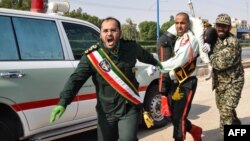Iran's Revolutionary Guards claims killed 'mastermind' behind Ahvaz attack
| Publisher | Radio Free Europe/Radio Liberty |
| Publication Date | 17 October 2018 |
| Cite as | Radio Free Europe/Radio Liberty, Iran's Revolutionary Guards claims killed 'mastermind' behind Ahvaz attack, 17 October 2018, available at: https://www.refworld.org/docid/5c34a6e313.html [accessed 27 May 2023] |
| Disclaimer | This is not a UNHCR publication. UNHCR is not responsible for, nor does it necessarily endorse, its content. Any views expressed are solely those of the author or publisher and do not necessarily reflect those of UNHCR, the United Nations or its Member States. |
2018-10-17
By RFE/RL
 An Iranian soldier carrying an injured comrade at the scene of an attack on a military parade in Ahvaz on September 22.
An Iranian soldier carrying an injured comrade at the scene of an attack on a military parade in Ahvaz on September 22.
Iran's Islamic Revolutionary Guards Corps (IRGC) claims it has killed the "mastermind" behind an attack on a military parade in the southwestern Iranian city of Ahvaz last month that left 24 people dead.
The IRGC said in a statement published on state media on October 16 that allied forces in Iraq killed a man identified as Abu Zaha, "the mastermind of the recent terrorist crime in Ahvaz," along with four other militants.
Iranian state television's website said Abu Zaha was a member of the Islamic State (IS), an extremist Sunni Muslim group that considers Iran's Shi'ite Muslim majority to be heretics.
The five were killed "during a reconnaissance and surprise operation by forces of the resistance this morning in Iraq's Diyalah Province," northeast of Baghdad, the statement said.
The "resistance" is a term used for Shi'ite militias operating in Iraq and Syria with training and support from the IRGC.
Both IS and an Iranian ethnic Arab opposition movement called the Ahwaz National Resistance, which seeks a separate state in Iran's oil-rich Khuzestan Province, claimed responsibility for the September 22 attack in Ahvaz. Neither group provided conclusive evidence to back up its claim.
Gunmen dressed in military uniforms opened fire during a parade marking the start of the 1980-88 Iran-Iraq War in an attack that officials said killed 24 Iranians, about half of them IRGC members, and left all the attackers dead.
On October 1, Iran claimed it had killed several IS leaders in eastern Syria in a missile strike and destroyed the militants' supplies and infrastructure.
IS once held nearly a third of the territory of Iraq and Syria, but military campaigns in the last year by government forces, Iran-backed Shi'ite militias, and U.S.-backed Sunni forces in both countries have forced the militant group's retreat from its former strongholds.
Since losing much of its territory, IS announced a strategy of focusing on suicide bombings and other attacks on foreign soil to fight its enemies.
Iranian Supreme Leader Ayatollah Ali Khamenei claimed that those responsible for the parade attack were paid by Sunni-dominated Saudi Arabia and the United Arab Emirates, and said that Iran will "severely punish" those behind the violence.
Saudi Arabia and the United Arab Emirates have denied involvement in the attack.
With reporting by AFP and Reuters
Link to original story on RFE/RL website
